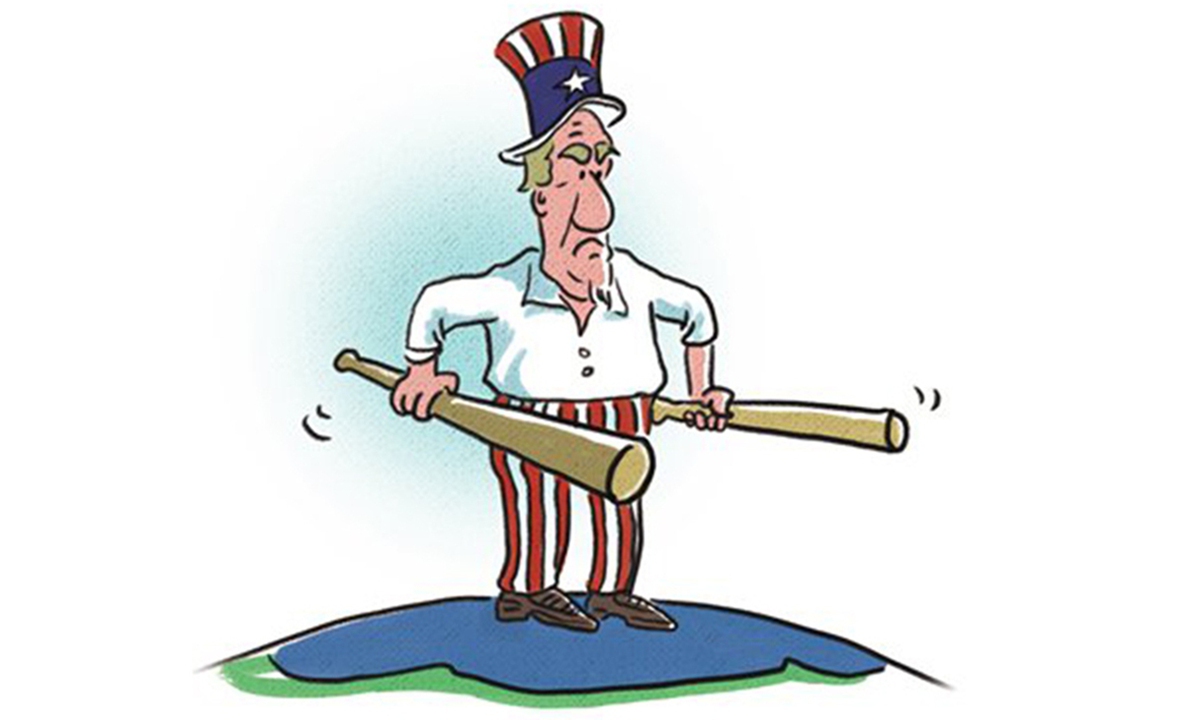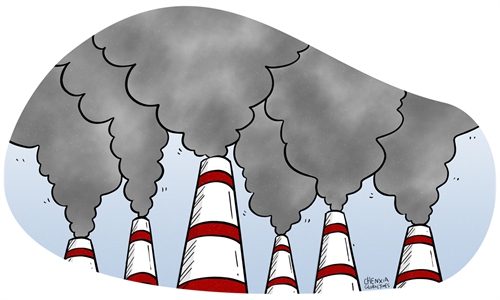
US hegemony Illustration: Liu Rui/GT
At a high-level meeting between US and Chinese officials in Anchorage, Alaska in March 2021, the Chinese side, represented by Yang Jiechi, director of the Office of the Foreign Affairs Commission of the CPC Central Committee, and State Councilor and Foreign Minister Wang Yi, called out the uncouth behavior of their US hosts with a by now famous phrase: "the US is not qualified to speak to China from a position of strength." He wasn't just speaking for China. After a string of global crises besetting Western leadership, from the financial meltdown of 2008 to the global pandemic, the meeting marked a turning point in the toleration of the nations of the Global South for Western hypocrisy.
"If you want to get along with us, let's deal with each other based on mutual respect," said Yang. Why was it even necessary for him to school the top diplomat of the US in the basics? The issue goes beyond personality.
In the post-Cold War era, without the constraint provided by the USSR, the US has grown entranced by the spectacle of unlimited military power. Lessons that should have been learned from its war of aggression on Indochina have been discarded. In Iraq, Afghanistan, Libya and Syria, it spent $8 trillion and killed 900,000 people to leave behind an arc of chaos. It spends a trillion dollars a year in unauditable military-expenditure. It has doubled down on a set of Cold War alliances in search of an enemy to replace the old one. It inhabits a permanent state of war.
Why talk when you can threaten?
US politicians compete to raise the military budget and cut spending on civilian needs such as education and healthcare. More often than not, diplomatic appointments in the US are political spoils to be handed out to fundraisers, aides, fixers and operatives from a self-referential political class instead of trained diplomats. Equipped with the foggiest notions of the outside world, they adopt fabricated stances from a short-term market for political ideas circulated by their revolving-door peers in media, public relations, and think tanks funded by the weapons industry.
Why think when you can posture?
From the empire of liberty to the rules-based order, the US has always seen itself as tasked by God to rule the world. It is "the indispensable nation" with a mission to dominate and shape the globe in its own image. It is good by definition. This self-adulation is impervious to experience, undimmed by its history of genocide and slaveholding. During the Cold War this messianism was tempered by clear thinking and realism. George Kennan crafted a conceptual framework and a long-term strategy for the containment of the Soviet Union. Henry Kissinger's realism brought Richard Nixon to Beijing. Both sought to understand and act in the world as they found it and within the finite limits of US power. Their Trans-Atlantic successors have not come to terms with a world altered by the rise of the rest.
Instead, their liberalism has evolved into a non-reality-based, quasi-religious cult of good VS evil, democracies VS autocracies, with a style of politics that seeks not accommodation but conversion, or else destruction. The other is demonized, and must thereafter be banned, sanctioned and subjugated. Any pause in hostilities, as former German chancellor Angela Merkel revealed of the Minsk agreement she signed, can only be a ruse to buy time to prepare the destruction of the other. Burdened by their higher mission, Western leaders should not be expected to abide by agreements made with moral inferiors. To characterize their non-Western counterparts they rely on atrocity propaganda and a tally of human rights violations ginned up by an ecosystem of media, think tanks and NGOs. They have no curiosity about the motives, aspirations or concerns of the other, no use for a dialogue of equals, no tolerance for difference, no capacity for diplomacy.
Why talk when you only need to talk to yourself?
As President Xi Jinping undertook in Riyadh recently the largest and highest-level diplomatic event between China and the Arab world since the founding of the People's Republic of China, US Ambassador to China Nicholas Burns "called on Beijing to stop its genocide in Xinjiang" on Twitter. This casual accusation of genocide is a deadly slander on the government and people of China that simultaneously provides grounds for US interventionism.
It was also an insult to the Arab Muslim leaders conferred at that moment with President Xi. The US, having invaded, occupied or bombed at least 14 Muslim countries since 1980, is apparently concerned about the genocide of Muslims in China while Arab leaders continue to voice support for China's policies. That Burns could tweet this and expect to be taken seriously as a diplomat there beggars belief.
The author is a former Malaysian government official. opinion@globaltimes.com.cn

